During summer vacation in Japan, all junior high school students rigorously practice to compete in the tournaments for their club activities.
These tournaments are incredibly important because every student in every city in every prefecture in Japan are competing in similar tournaments. And the winners advance to the larger tournaments until the final tournament near Tokyo, which includes all the best teams from throughout Japan.
These tournaments are also important because during or after summer vacation, the 3年生 retire from their club activities. They must focus on getting into high school, and can no longer compete in tournaments or games.
There's an English speech contest that follows this same trend, and for my students it begins in the region of Hida on Tuesday, August 21st. The winners proceed to the Gifu English Speech Contest in September, and those winners continue to Tokyo for the All Japan Contest, which is in October or November, or some time.
2 weeks after the Takayama Speech Contest, we received the email containing all the information about the Hida contest. All schools had identical participation limits, unlike the Takayama contest. Each school could submit a maximum of 6 students to the contest. Much like the Takayama contest, I was determined to get the maximum amount of students to participate.
Kiyomi Junior High only has 71 students, and I've gotten to know the English level of my students pretty well. The 3年生 and 2年生 students were easy to choose, but I still didn't know who to choose for 1年生, and I've been thinking about it ever since the Takayama contest. I had some idea, but this was the same week as our first term exam in school. Those tests results help me confirm and add a few additional students to my "radar".
With only 6 spots open, I asked 5 3年生 students, 4 2年生 students, and 4 1年生 students. I asked all of them on June 20th, and wanted them to reply to me back June 27th.
The 3年生 students were the same ones I asked for the Takayama contest. Having already done the contest, they really didn't want to do another one. 3 of the 2年生 confidently replied, "Yes," so that made me happy. The other student also did the Takayama contest, and also didn't want to do it again. All 4 of the 1年生 confidently said, "Yes," too, which was really surprising. They're so shy in class, and never speak to me in English. Unfortunately, the limit was 6, so one of the 1年生 had to back down.
But, I now had my 6 participates.
The deadline to sign up for the contest was July 18th, which included a copy of their speech written in English and Japanese, side-by-side on a single A4 piece of paper. The students had 3 weeks to get their speeches finished, and translated into English, and ready to go.
It's kind of short.
I gave the students a week to write their speeches with a July 4th deadline. I gave them instructions on how they should write their speeches, and I have them some sample topics, too.
I think the best speeches are ones that have a clear beginning, middle, and end. Ones that focus on some kind of personal conflict or tragedy in their life, how their lives changes because of the conflict, and what they learned from it, or how they overcame it to become a better person.
Good speeches also include tons of examples, and stories that explain the topic they're presenting. Or, the speech could simply be an entire story, with the writer explaining it in an interesting way, and talking about their thoughts on the story as its being told.
For another level above this, it would be really good if the students thought about their own emotions, and express those within the writing, so they could bring out those emotions during their speech.
I received most of the student's speeches, and started translating them into English. One of the speeches was perfect, and didn't need any further edits. It was a little long, but was possible to read in 4 minutes. The other speeches all had some problems. Most of the speeches simply lacked examples, or personal thoughts. Another student's was way too damn short.
I added my notes to their Japanese speeches. I asked specific questions to the students, so they could add more sentences with the kind of content that would make a better speech.
After the second round of editing, 2 more students' speeches were compete, but the other 3 were not good.
One was still too short. His speech was about an interesting math problem, but it took less than 2 minutes to read. I had him add a second math problem to his speech, so it would be the correct length. It turned out pretty good after that.
The other two speeches had no purpose. One of them had a clear topic, but they both just talked about stuff, and then ended. It was just information, and even with some personal thoughts, nothing really connected together. The English teacher and I talked to them again about the structure of a speech, and there should be a clear beginning, middle and end.
I got their finished speeches the day of the deadline, and they were good enough.
Actually, what I thought was the original deadline for the speeches, July 18th, was only for the entry. The actual speeches weren't due until August 1st. So, we had some more time to talk with the students, and fix their speeches.
But it was much more difficult to talk with the students during summer, since they came to school so infrequently. We did finally finish those last two speeches.
Much like the Takayama contest, I solely went through each of the student's speeches, translated them to English, and wrote a speech based on the translation. It's a lot of work. So much so, that when the English teacher tried to do it, he said it was too difficult for him.
I can understand most of the grammar used in these speeches. I just can't understand most of the Kanji used, nor their meaning, nor some of the meaning of hiragana words. For each speech, I had a running vocabulary list. Once that list was complete, I put together the sentences. I also used Google Translate to double check some mistakes. Then the English teacher checked my translation.
After that, I wrote out the English speech. And went over the speech again to remove any dialect or accent differences, and also replaced some difficult words with simple English. I made sure to use grammar and vocabulary the students should know, too.
I didn't have many problems with the translation, but there were a few sentences that I absolutely could not understand, and it took the English teacher and I about 30 minutes, or an hour to figure out a correct translation.
For example, this sentence:
中身のブランデーの値段は空きビンより$40高いわけだから
Contents of Brandy of Price は empty bottle more than $40 expensive reason because of
I could not understand the grammar behind 空きビンより$40高い. より is comparative, so whatever is ____より is being compared to the subject. So, 中身のブランデーの値段 The price of the contents of the Brandy, is より more 高い expensive than 空きビン the empty bottle.
But how does $40 factor into this? The rest of the text implies that it's written in a confusing way, and the preceding math problem doesn't make sense if the Brandy is $40.
Ultimately, after thinking about it for a little while, I figured it out, and the following translation fit everything perfectly:
The price of the contents of the Brandy is more than $40 and the price of the empty bottle.
Anyway, all the speeches had been translated and written, and now the students had to begin memorizing, and learning how to perform their speeches effectively. 3 speeches were complete before the end of the semester, July 18th. Another was finished that weekend, July 21st. And the other two were finished on August 1st.
For each of the students, I created a study guide and CD to help them practice pronunciation, and memorization.
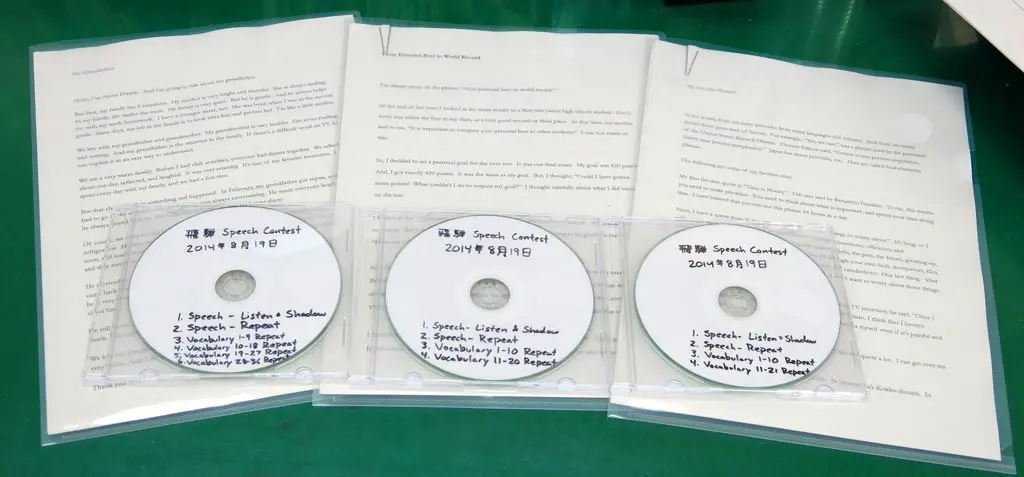
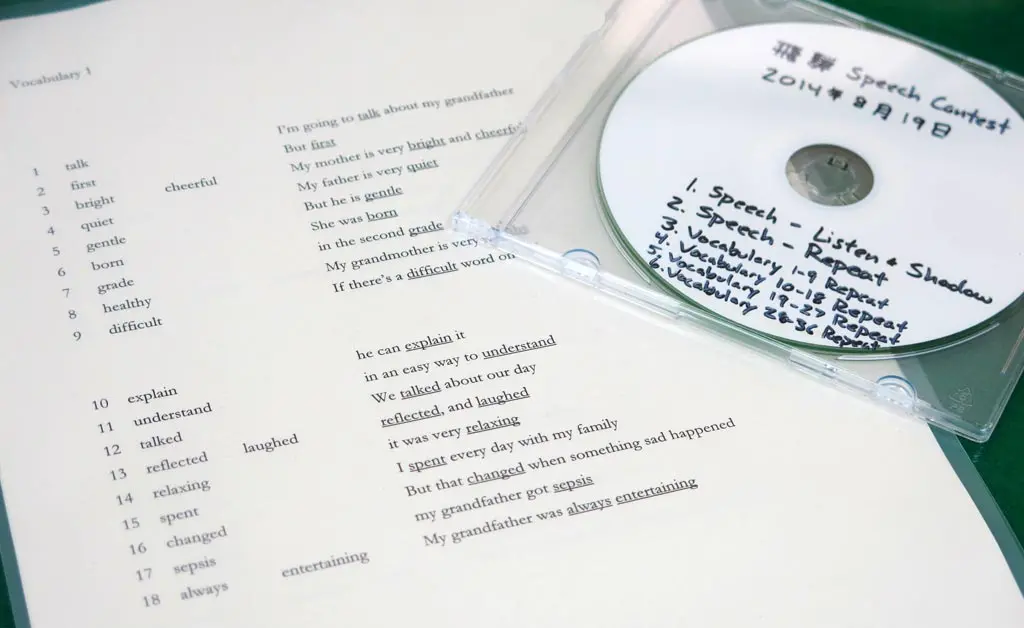
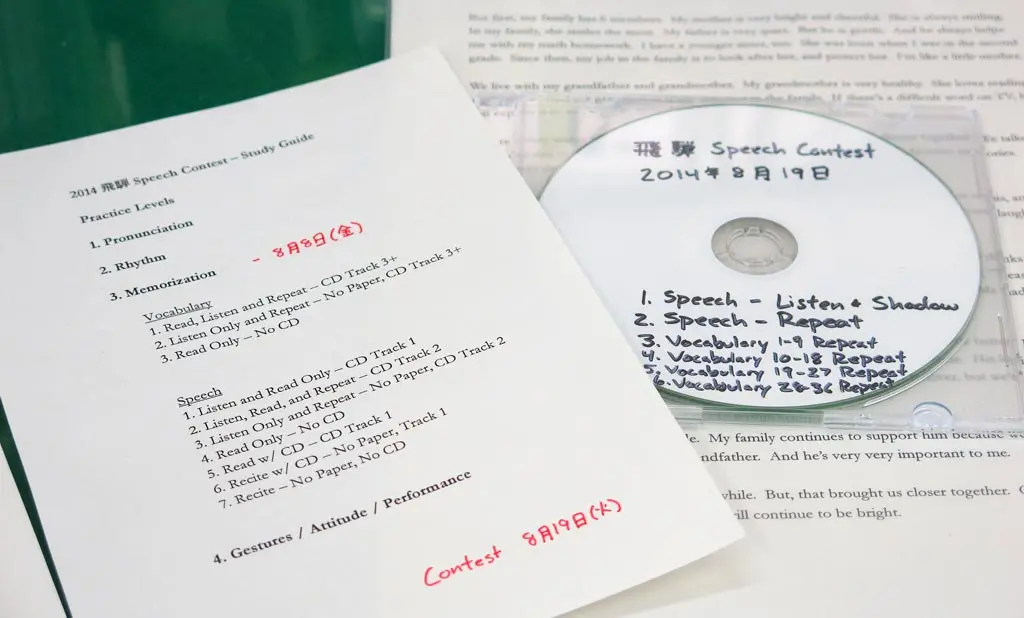
Each student got an English copy of their speech in large 12 point font. They also got a copy of their entry form, which had the English and Japanese version of their speech.
Also, I had each student read through their speech one time, and I made notes about each word that was difficult for them to read. I create a vocabulary list which had each word.
Then for the CD, the first track was a straight reading of the speech. For the second track, I read each sentence, then gave time for the student to repeat the sentence. Then the remaining tracks contained the vocabulary list, and pauses for the students to repeat.
In addition, I gave them a sheet of paper with study points. For memorization, I gave them a road map on how they could memorize their speech. Once they could complete a number, they could cross it off, and go to the next.
Each student said they practiced with the CD, and said it was helpful, only one of my students actually memorized their speech completely. I don't think they actually used the CD as much as they should have. I think I should have made an easier ladder for them to climb.
I think it also would've been more helpful, if I create a more structure and solid summer schedule before the end of the school year, rather than a week after the speech deadline.
I met with my students only once a week during summer. They absolutely made progress over this time, but I think they should've practiced more often on their own. Meeting more times over the summer could have given them more motivation to practice.
But, I dunno. I don't know the student's personal schedule, or if they're able to practice at home. A simple hour each day would easily be enough, but maybe they didn't have an hour.
I gave them until August 9th to memorize their speech, but no one made that deadline. Later, only one student would actually have their entire speech memorized for the contest.
During our practice over summer, I gave the students a copy of the judging criteria, and I went over what each student needed to do to improve and achieve the goals listed on the sheet.
Most students needed a louder voice, so we practiced in the hallway at school with a very large distance between us. Other students needed to smile, so I kept reminding them to smile during practice. We practiced rhythm, and volume control. Since most students didn't memorize their speech, I tried to train them to read from their speech, but maintain eye contact with the audience, so it still appeared natural.
The day finally came, and my students were very nervous. They were all split up into different groups, and had to compete against 11 or 12 other students in each group. The best 3 from each group would continue to the finals in the afternoon. The top 7 students from the finals would continue to the Gifu tournament in September.
Each group had 2 judges, and each judge was an ALT, so I was unable to run around to see all my students perform their speeches. And I wasn't able to take photos, either.
Unfortunately, none of my students did well enough to make it to the finals. They were really nervous, and did not practice enough on their own to deliver their speeches effectively. I understand it takes an incredible amount of work to memorize and effectively perform your speech, but all that work makes the experience less nerve wrecking, and dreadful.
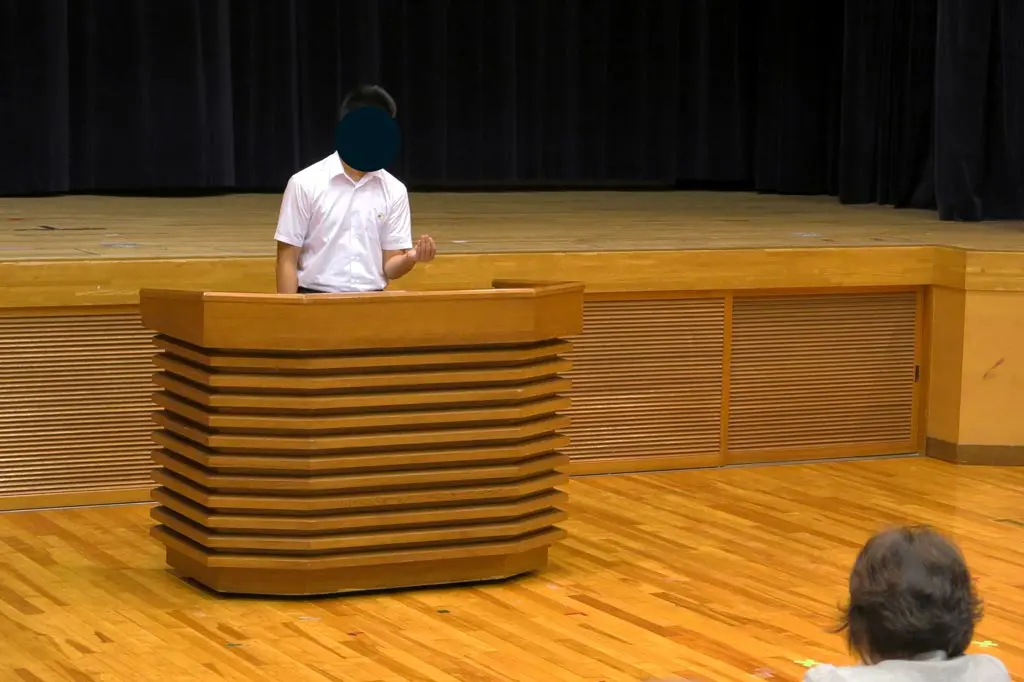
The judging came and went, and none of my students made the cut. The finals were pretty good. There were absolutely some clear winners with some great speeches. Others were pretty entertaining, too.
Even though, they didn't win, that really wasn't the point for any of these students. I asked each student for their goal, and each student responded with wanting to improve their English skills. In that way, I think each of them accomplished their goal. With the exception of one student, every student had amazing pronunciation. They can say their Rs, and Ls, THs, Ss, and other difficult to pronounce English just fine. :)
I think for each of the student's English class will be much easier going forward. (Of course, they already are A students in class.)
For each of the students, the English teacher and I made a print to display outside of the English classroom. Each print contains the English and Japanese version of the students' speeches, their names and event, a photo of them during their speech, and some comments made by the English teacher, who was able to listen to each speech.
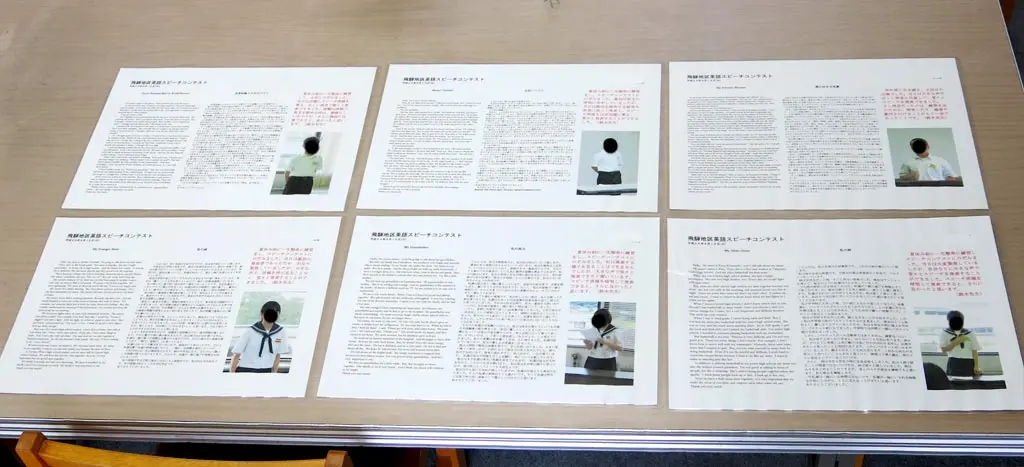
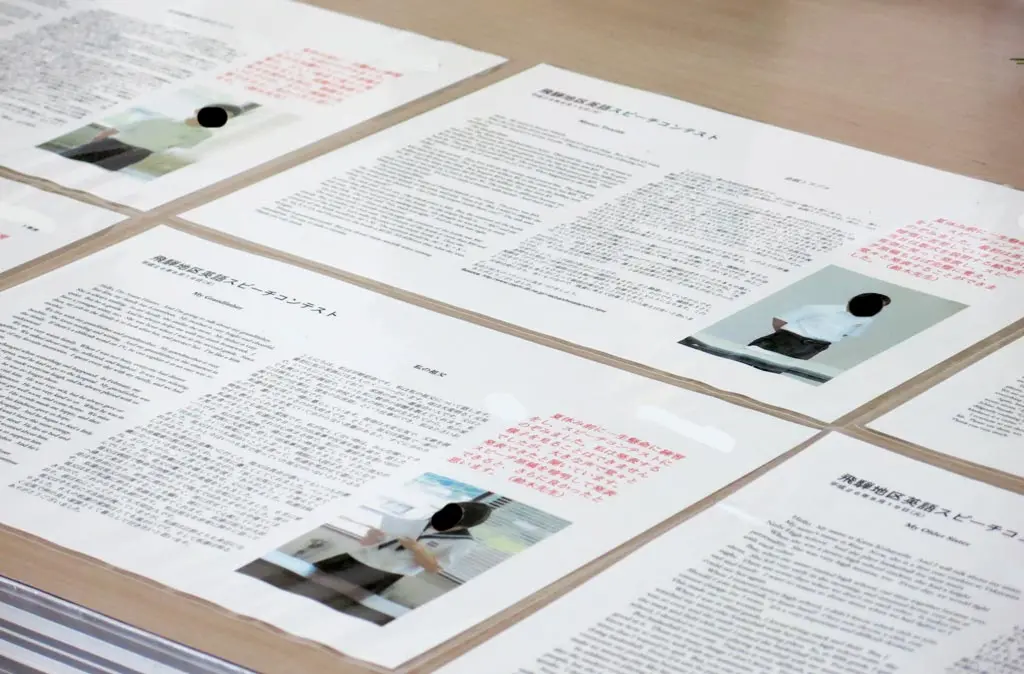
For the time being, they'll be displayed downstairs, so when the school has its Sports Festival, all the parents can take a look at the speeches, and be proud of their kids. :)
Again, they didn't do well in the competition, but I think they still gained some valuable experience for the future. I think they'll do way better next year if I'm able to convince them to compete, again.